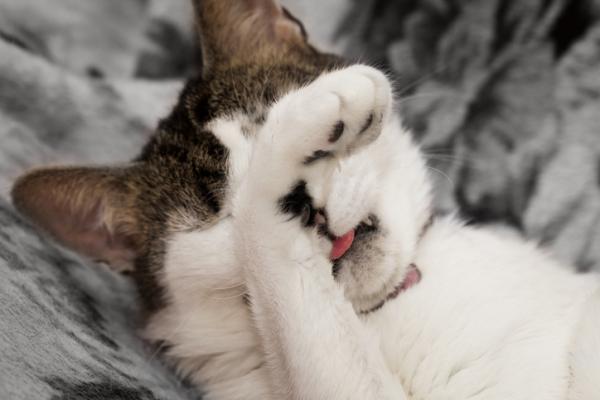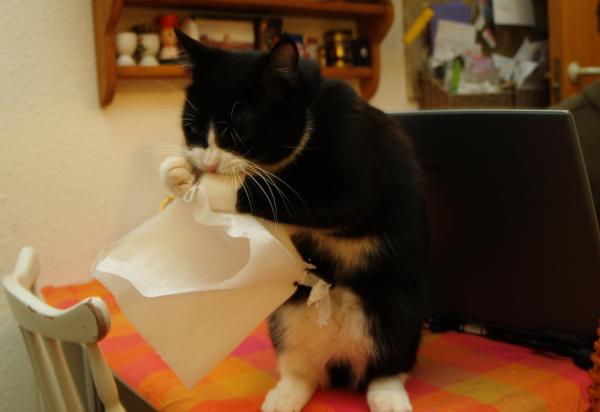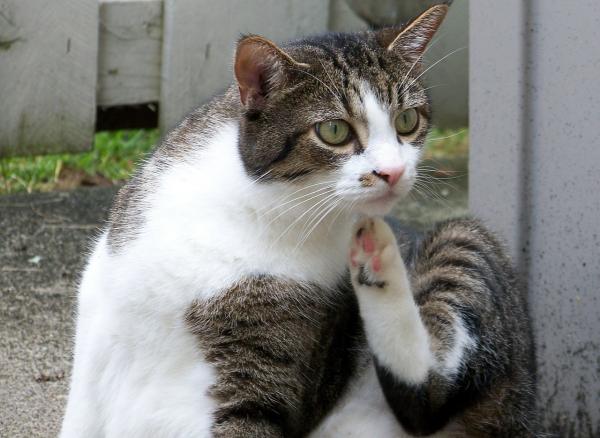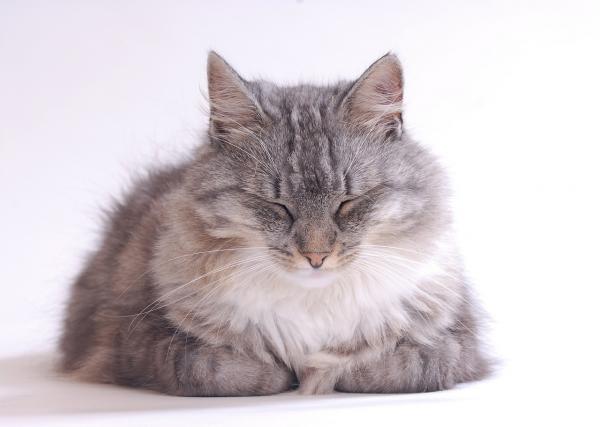Allergy in cats – Symptoms and treatment

Surely you’ve heard that some acquaintance has an allergy to cats, but did you know that cats can also have allergies to different things, including allergy to humans and their habits?
If you are the owner of a cat you will be interested in this article, where are we going to tell you all about the allergy in cats, their symptoms and their treatment. If you think your cat has allergy symptoms do not hesitate to take it to the veterinarian for testing.
What is allergy and what types can a domestic cat have?
Allergy is a physiological reaction of the organism that arises when the immune system detects some substance harmful to the body. Therefore it is a defense and warning system that something is damaging the health of our pussycat.
Felines can have allergies to many different things as it happens to us. Some most common things that produce allergies in our cats They are:
- Different plants
- Mushrooms
- Poland
- Some foods
- Tobacco smoke
- Perfumes
- Human
- Anti-flea products
- Cleaning
- Plastic materials
- Flea bite

Aggravating factors of allergy in cats
There are factors that will make the allergy more serious. These factors are:
- Lanumber of allergens with which our cat is in contact. For example if you are allergic to pollen, in spring there is much more and our feline will be much worse than at other times of the year.
- The association of other allergies. It is typical for a cat suffering from an allergy to have other allergies because they are very sensitive. For example, if you are allergic to pollen, it is likely to be allergic to some food.
- The association of other diseases. This leaves affected felines weaker and with a very low immune system. In addition, problems such as skin infections will make the cat scratch a lot more.
- External factors. The excess heat and the presence of things that cause stress to the feline affected by allergy are other factors that will make the allergy worse and its symptoms such as continuous scratching.

Most common symptoms in cat allergies
As there are many types of allergies there are many symptoms. Next we expose you the most common and easy to identify symptoms:
- Tos
- Sneezing
- Runny nose
- Ocular secretion
- Itchy nose
- Itchy eyes
- Lack of hair
- Itching and scratching
- Reddened skin
- Inflamed skin
- Cutaneous infections
- Vomiting
- Diarrhea
Remember that if you observe any of these symptoms or more than one, you should take your kitten to the veterinarian immediately to perform tests and offer treatment.

How to diagnose allergies in cats?
Often It is not easy to find the cause of the allergy. Therefore, the veterinarian must perform some tests. Therefore, in most cases, the allergen is detected by eliminating the possible causes until we locate the causative agent. The most commonly used ways to diagnose the origin of an allergy are:
- At the veterinarian you should do different tests such as blood tests, scrapes of the skin of the affected areas and allergic tests among others.
- In case of suspecting food allergy, to identify what is the food that is caused to our pussycat, we will have to give it again the food that we gave before the treatment to stop the allergy. Once the allergy has passed with the treatment that the veterinarian has given us, we will have to go introducing back into the diet, one at a time, the foods that are suspected of causing the allergy. This way we will identify the causative food and therefore we will avoid giving it back for life. For food allergies, this is a much more reliable form of detection than blood tests, which are usually not entirely clarifying. This manifestation of food allergy can appear in cats older than seven years who have always been eating more or less the same, since the allergy usually has a long process for the body to end up triggering it and therefore it is possible that previously it was not no symptoms
- At home we will have to remove objects suspected of causing the allergy of our cat’s environment. If the allergy remits and we want to know what triggers it, we will introduce the removed objects one by one again to observe the symptoms in our cat until we find the cause of the problem.

How to treat allergies in cats?
Keep in mind that there is no medication to cure allergies, you can only administer the appropriate antiallergic according to the diagnosis and remove the object causing the allergy. Thus, the treatment to follow will depend on the type of allergy that we think that the feline suffers. Some of the steps to follow regarding the treatment and solution of some allergies are in each case:
- If we detect that the allergy comes from the diet, the treatment is simple since the veterinarian will inject our partner with antihistamines to reduce the symptoms and he will recommend that we give him a special hypoallergenic food. These feed and cans of cat food especially hypoallergenic, as the name suggests, contain nutrients that do not cause allergies in cats and so at a minimum of 12 days we will see the clear improvement of our feline. In these cases it is recommended that the hypoallergenic diet be for life.
- If we notice that the hair is missing and the skin is red and inflamed on the back, neck and tail, it is likely that our kitten has an allergy to the flea bite, specifically to the saliva of the fleas. The allergic reaction starts right away when our feline friend is bitten by a flea. In severe cases it can spread to the legs, head and abdomen. In addition, it will end up triggering a miliary dermatitis with scabs and peeling skin. In this case we must take it to the veterinarian to provide the necessary medication to alleviate the allergy, as well as treatment will recommend us to eliminate all fleas from both the cat and their environment and give baths with special soap to soothe itching and help recover the health of your skin. We must always use a flea treatment, especially in the months of more activity of these, thus preventing fleas from biting our cat allergic to them.
- Sometimes cats are allergic to some plastic materials with which the feeders are made and drinkers that we use for them. This allergy will be detected because the skin and hair problems will occur in the area of the head, face and more specifically the nose. They will not be able to stop scratching and will avoid eating or drinking from these containers. We will have to go to the veterinarian to treat the symptoms of the cutaneous allergy as in the previous case and we will have to remove these containers and provide some of stainless steel, glass or porcelain that do not provoke allergic reactions in our feline.
- In the case that the diagnosis made by the veterinarian reveals that the feline allergy comes from the habits that we have at home, we must change and leave these habits so that our cat stops suffering from allergies. In addition, the veterinarian must provide the necessary medication to help remission of the allergy. Some of these habits that produce allergies in domestic cats are the use of tobacco, perfumes, certain cleaning products and the accumulation of dust among others. All these components produce a respiratory allergy and even asthma.
- The case that complicates more the coexistence between cats and humans, is the allergy that a cat can have to people, that is, to Dandruff and flaking of human skin. In this case, the veterinarian will provide the appropriate antiallergic treatment and we should try to have our house as clean as possible in terms of dust, because that is where our remains of peeling skin that cause allergy to our partner accumulates.

This article is merely informative, in .com we do not have the faculty to prescribe veterinary treatments or make any kind of diagnosis. We invite you to take your pet to the veterinarian in case of any type of condition or discomfort.
If you want to read more articles similar to Allergy in cats – Symptoms and treatment, we recommend that you enter in our section of Other health problems.


